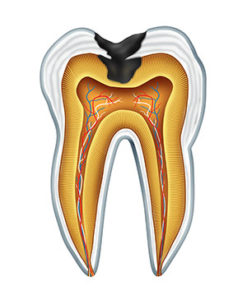What Are Cavities And How Do They Form?
What Are Cavities?
 One of the most common dental problems is tooth decay, also known as cavities. Tooth decay is affected by one’s lifestyle, diet, and oral hygiene. Genetics also play a role in determining how susceptible your teeth are to decay.
One of the most common dental problems is tooth decay, also known as cavities. Tooth decay is affected by one’s lifestyle, diet, and oral hygiene. Genetics also play a role in determining how susceptible your teeth are to decay.
Types Of Cavities
Cavities usually occur more often among children, but adults are at risk as well. There are three types of cavities that you want to watch out for:
- Root cavities form when bacteria grow on tooth roots that are exposed.
- Recurrent cavities form around fillings and crowns where plaque has built up and caused decay.
- Coronal cavities are located on chewing surfaces or in between teeth.
What Causes Cavities?
Bacteria feed on sugar and starch and multiply. Harmful bacteria can build on your teeth and produce acid that dissolves the protective coating on your teeth, which is known as enamel. When enamel dissolves, it can lead to cavities.
Cavities form most easily in pits on the chewing surfaces of your back teeth, in between your teeth, and by your gumline. If you eat foods that contain a lot of carbohydrates (starches and sugars), these carbohydrates are eaten in turn by bacteria in the plaque, which produces acids that eat your tooth.
As this continues, the tooth enamel starts breaking down below the surface while the surface itself remains intact. Once enough of the sub-surface enamel is gone, the surface collapses and forms a cavity.
Dry Mouth Can Increase Your Risk Of Cavities
Adults who have dry mouth are at a higher risk for cavities. Dry mouth is a condition caused by a lack of saliva. It is caused by medication, illness, chemotherapy, and radiation therapy, among other causes. Dry mouth can last temporarily (from a few days to many months), but permanent cases also exist. It all depends on the cause.
We take cavities very seriously. If they remain unchecked, they can destroy the tooth they’ve infecting. More than that, they can kill the delicate nerves at the center of the tooth, which can cause an abscess (an area of infection at the root tip). After an abscess has formed, the only ways we can treat it is with surgery, a root canal, or by extraction.
How Can I Tell If I Have a Cavity?
Dr. Scott Street and the rest of the team here at T-Town Smiles are trained to recognize and treat cavities. Since cavities grow beneath the surface of your teeth, you can’t see them. The best way to detect them and remedy the situation is by visiting T-Town Smiles regularly for checkups.
How Can I Prevent Myself From Getting Cavities?
There some things you can do to prevent yourself from getting a cavity:
- Brush your teeth at least twice a day and floss every day. This will remove plaque from in between your teeth and below your gumline.
- Come in for regular dental check-ups. Preventive care will help stop dental complications from happening and keeps small problems from becoming larger ones.
- Eat a well-balanced diet limited in sugary and starchy. When you do consume those foods, try to eat them along with your meal instead of as snacks. This will reduce the number of times your teeth get exposed to acid.
Accepting New Patients
Looking for a full-service dentist in Tulsa?
At the office of Dr. Scott Street, we offer stress-free family care using modern technology and an old-fashioned personal approach. We provide a full selection of dental treatments, from routine cleanings to top-quality dental restorations. If you are looking for a full-service family dentist in Tulsa, OK, call us today at 918-481-4922 or use our online Appointment Request form.
Office Location
Suite 1107 (11th Floor)
Tulsa, OK 74136
Phone: 918-481-4922
Fax: 918-481-4969
Office Hours
Tuesday 8am - 5pm
Wednesday 8am - 5pm
Thursday 8am - 5pm
Friday 8am - 5pm
Additional times are available.
Dr. Scott Street and the team at T-Town Smiles are proud to be the local Tulsa Dentist serving families in Tulsa, Broken Arrow, Jenks, Oakhurst, Bixby, Glenpool and surrounding Tulsa communities.



